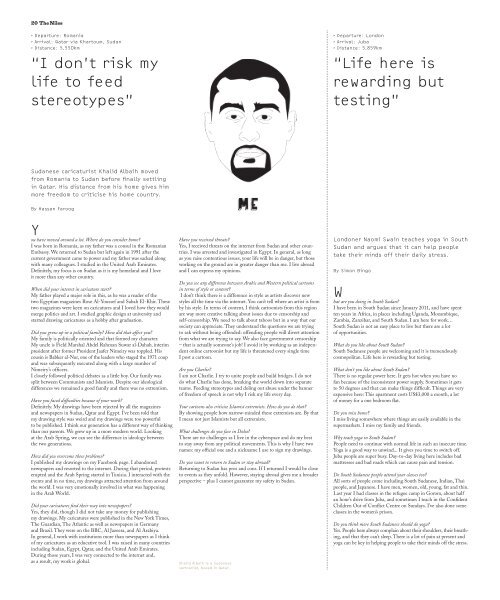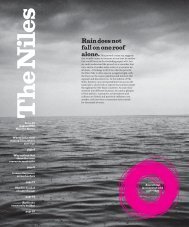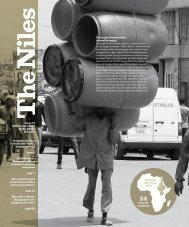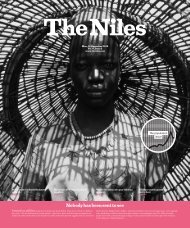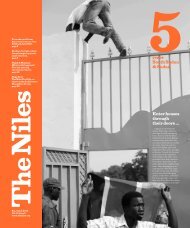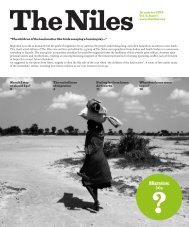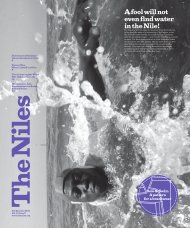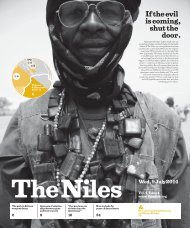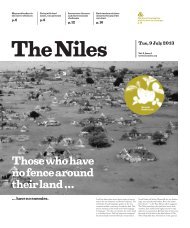Experience is a solid walking stick...
I don’t know where to start. I wish I had taken my wife. Who am I without my school certificates? These three remarks by refugees, scribbled into notebooks by The Niles correspondents, support the Sudanese proverb that ‘experience is a solid walking stick’. War, hunger and poverty have repeatedly forced both Sudanese and South Sudanese to flee their homes. Right now more than 4.5 million people are on the road in the two countries, like these passengers on a bus from Khartoum to Shendi. The fifth edition of The Niles documents their journeys, following their routes to neighbouring villages, fast-expanding cities or the other side of the globe, revealing diverse experiences with a recurring theme: When you leave home, the familiar is lost but the essential remains.
I don’t know where to start. I wish I had taken my wife. Who am I without my school certificates? These three remarks by refugees, scribbled into notebooks by The Niles correspondents, support the Sudanese proverb that ‘experience is a solid walking stick’. War, hunger and poverty have repeatedly forced both Sudanese and South Sudanese to flee their homes. Right now more than 4.5 million people are on the road in the two countries, like these passengers on a bus from Khartoum to Shendi. The fifth edition of The Niles documents their journeys, following their routes to neighbouring villages, fast-expanding cities or the other side of the globe, revealing diverse experiences with a recurring theme: When you leave home, the familiar is lost but the essential remains.
Create successful ePaper yourself
Turn your PDF publications into a flip-book with our unique Google optimized e-Paper software.
20 The Niles<br />
> Departure: Romania<br />
> Arrival: Qatar via Khartoum, Sudan<br />
> D<strong>is</strong>tance: 5,550km<br />
“I don’t r<strong>is</strong>k my<br />
life to feed<br />
stereotypes”<br />
> Departure: London<br />
> Arrival: Juba<br />
> D<strong>is</strong>tance: 5,859km<br />
“Life here <strong>is</strong><br />
rewarding but<br />
testing”<br />
Sudanese caricatur<strong>is</strong>t Khalid Albaih moved<br />
from Romania to Sudan before finally settling<br />
in Qatar. H<strong>is</strong> d<strong>is</strong>tance from h<strong>is</strong> home gives him<br />
more freedom to critic<strong>is</strong>e h<strong>is</strong> home country.<br />
By Hassan Faroog<br />
Y<br />
ou have moved around a lot. Where do you consider home?<br />
I was born in Romania, as my father was a consul in the Romanian<br />
Embassy. We returned to Sudan but left again in 1991 after the<br />
current government came to power and my father was sacked along<br />
with many colleagues. I studied in the United Arab Emirates.<br />
Definitely, my focus <strong>is</strong> on Sudan as it <strong>is</strong> my homeland and I love<br />
it more than any other country.<br />
When did your interest in caricature start?<br />
My father played a major role in th<strong>is</strong>, as he was a reader of the<br />
two Egyptian magazines Rose Al-Youssef and Sabah El-Khir. These<br />
two magazines were keen on caricatures and I loved how they would<br />
merge politics and art. I studied graphic design at university and<br />
started drawing caricatures as a hobby after graduation.<br />
Did you grow up in a political family? How did that affect you?<br />
My family <strong>is</strong> politically oriented and that formed my character.<br />
My uncle <strong>is</strong> Field Marshal Abdel Rahman Suwar al-Dahab, interim<br />
president after former President Jaafer Nimeiry was toppled. H<strong>is</strong><br />
cousin <strong>is</strong> Babker al-Nur, one of the leaders who staged the 1971 coup<br />
and was subsequently executed along with a large number of<br />
Nimeiry’s officers.<br />
I closely followed political debates as a little boy. Our family was<br />
split between Commun<strong>is</strong>ts and Islam<strong>is</strong>ts. Despite our ideological<br />
differences we remained a good family and there was no extrem<strong>is</strong>m.<br />
Have you faced difficulties because of your work?<br />
Definitely. My drawings have been rejected by all the magazines<br />
and newspapers in Sudan, Qatar and Egypt. I’ve been told that<br />
my drawing style was weird and my drawings were too powerful<br />
to be publ<strong>is</strong>hed. I think our generation has a different way of thinking<br />
than our parents. We grew up in a more modern world. Looking<br />
at the Arab Spring, we can see the difference in ideology between<br />
the two generations.<br />
How did you overcome these problems?<br />
I publ<strong>is</strong>hed my drawings on my Facebook page. I abandoned<br />
newspapers and resorted to the internet. During that period, protests<br />
erupted and the Arab Spring started in Tun<strong>is</strong>ia. I interacted with the<br />
events and in no time, my drawings attracted attention from around<br />
the world. I was very emotionally involved in what was happening<br />
in the Arab World.<br />
Did your caricatures find their way into newspapers?<br />
Yes, they did, though I did not take any money for publ<strong>is</strong>hing<br />
my drawings. My caricatures were publ<strong>is</strong>hed in the New York Times,<br />
The Guardian, The Atlantic as well as newspapers in Germany<br />
and Brazil. They were on the BBC, Al Jazeera, and Al Arabiya.<br />
In general, I work with institutions more than newspapers as I think<br />
of my caricatures as an educative tool. I was ra<strong>is</strong>ed in many countries<br />
including Sudan, Egypt, Qatar, and the United Arab Emirates.<br />
During those years, I was very connected to the internet and,<br />
as a result, my work <strong>is</strong> global.<br />
Have you received threats?<br />
Yes, I received threats on the internet from Sudan and other countries.<br />
I was arrested and investigated in Egypt. In general, as long<br />
as you ra<strong>is</strong>e contentious <strong>is</strong>sues, your life will be in danger, but those<br />
working on the ground are in greater danger than me. I live abroad<br />
and I can express my opinions.<br />
Do you see any difference between Arabic and Western political cartoons<br />
in terms of style or content?<br />
I don’t think there <strong>is</strong> a difference in style as art<strong>is</strong>ts d<strong>is</strong>cover new<br />
styles all the time via the internet. You can’t tell where an art<strong>is</strong>t <strong>is</strong> from<br />
by h<strong>is</strong> style. In terms of content, I think cartoon<strong>is</strong>ts from th<strong>is</strong> region<br />
are way more creative talking about <strong>is</strong>sues due to censorship and<br />
self-censorship. We need to talk about taboos but in a way that our<br />
society can appreciate. They understand the questions we are trying<br />
to ask without being offended: offending people will divert attention<br />
from what we are trying to say. We also face government censorship<br />
– that <strong>is</strong> actually someone’s job! I avoid it by working as an independent<br />
online cartoon<strong>is</strong>t but my life <strong>is</strong> threatened every single time<br />
I post a cartoon.<br />
Are you Charlie?<br />
I am not Charlie. I try to unite people and build bridges. I do not<br />
do what Charlie has done, breaking the world down into separate<br />
teams. Feeding stereotypes and doling out abuse under the banner<br />
of freedom of speech <strong>is</strong> not why I r<strong>is</strong>k my life every day.<br />
Your cartoons also critic<strong>is</strong>e Islam<strong>is</strong>t extrem<strong>is</strong>ts. How do you do that?<br />
By showing people how narrow-minded these extrem<strong>is</strong>ts are. By that<br />
I mean not just Islam<strong>is</strong>ts but all extrem<strong>is</strong>ts.<br />
What challenges do you face in Doha?<br />
There are no challenges as I live in the cyberspace and do my best<br />
to stay away from any political movements. Th<strong>is</strong> <strong>is</strong> why I have two<br />
names: my official one and a nickname I use to sign my drawings.<br />
Do you want to return to Sudan or stay abroad?<br />
Returning to Sudan has pros and cons. If I returned I would be close<br />
to events as they unfold. However, staying abroad gives me a broader<br />
perspective – plus I cannot guarantee my safety in Sudan.<br />
Khalid Albaih <strong>is</strong> a Sudanese<br />
cartoon<strong>is</strong>t, based in Qatar.<br />
Londoner Naomi Swain teaches yoga in South<br />
Sudan and argues that it can help people<br />
take their minds off their daily stress.<br />
By Simon Bingo<br />
W<br />
hat are you doing in South Sudan?<br />
I have been in South Sudan since January 2011, and have spent<br />
ten years in Africa, in places including Uganda, Mozambique,<br />
Zambia, Zanzibar, and South Sudan. I am here for work…<br />
South Sudan <strong>is</strong> not an easy place to live but there are a lot<br />
of opportunities.<br />
What do you like about South Sudan?<br />
South Sudanese people are welcoming and it <strong>is</strong> tremendously<br />
cosmopolitan. Life here <strong>is</strong> rewarding but testing.<br />
What don’t you like about South Sudan?<br />
There <strong>is</strong> no regular power here. It gets hot when you have no<br />
fan because of the incons<strong>is</strong>tent power supply. Sometimes it gets<br />
to 50 degrees and that can make things difficult. Things are very<br />
expensive here: Th<strong>is</strong> apartment costs US$3,000 a month, a lot<br />
of money for a one bedroom flat.<br />
Do you m<strong>is</strong>s home?<br />
I m<strong>is</strong>s living somewhere where things are easily available in the<br />
supermarkets. I m<strong>is</strong>s my family and friends.<br />
Why teach yoga in South Sudan?<br />
People need to continue with normal life in such an insecure time.<br />
Yoga <strong>is</strong> a good way to unwind... It gives you time to switch off.<br />
Juba people are super busy. Day-to-day living here includes bad<br />
mattresses and bad roads which can cause pain and tension.<br />
Do South Sudanese people attend your classes too?<br />
All sorts of people come including South Sudanese, Indian, Thai<br />
people, and Japanese. I have men, women, old, young, fat and thin.<br />
Last year I had classes in the refugee camp in Gorom, about half<br />
an hour’s drive from Juba, and sometimes I teach in the Confident<br />
Children Out of Conflict Centre on Sundays. I’ve also done some<br />
classes in the women’s pr<strong>is</strong>on.<br />
Do you think more South Sudanese should do yoga?<br />
Yes. People here always complain about their shoulders, their breathing,<br />
and that they can’t sleep. There <strong>is</strong> a lot of pain at present and<br />
yoga can be key in helping people to take their minds off the stress.<br />
theniles_enar_20150327.indd 20<br />
2015/3/31 1:50 PM


